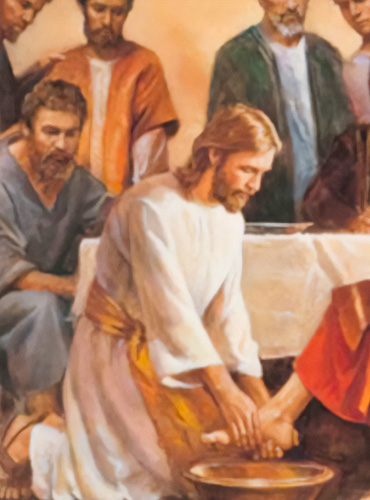Thursday of the Fourth Week of Easter – Jn 13:16-20
Today’s Gospel reading might strike us as an odd one during this Easter season: it comes from the Last Supper discourse, yet the tone and Jesus’ injunctions seem rather sad. We can divide the passage into three parts: first, Christ’s injunction regarding the need for humility, second, the reference to Judas, and, third, the encouragement meant for the Apostles. So, humility, Judas, and encouragement.
In the first section, Jesus reminds His Apostles that “no slave is greater than his master (κυρίου) nor any messenger (ἀπόστολος) greater than the one who sent him.” Christ presents Himself as the Lord and the One who sends. Jesus follows this with an odd phrase: “If you understand this, blessed are you if you do it.” In the preceding lines, Jesus really hasn’t said anything specific to be done. Rather, it is a more general injunction, a reminder to His followers, and to us, of our identity as servants of God’s people, and that we do not belong to ourselves. It reminds us of our need to center our lives solely and exclusively on Christ and to turn to Him for the work to be done; slaves rely on their masters for everything, to know what needs to be done, how to do it, when to do it, everything: Christ tells us “without me you can do nothing” (Jn 15:5). Not some things, but nothing. This humility keeps us centered on Christ and His will which, as religious, are manifested through our rules and through our superiors.
In second place, Christ warns that this advice is of no good for some; He says, “I am not speaking of all of you,” or, as some translations have it “I am not thinking of all of you when I say this, I know who are the men I have chosen.” Then follows a citation from Psalm 41. Writing this Psalm many centuries before, David probably had in mind his adviser, Ahithophel, who abandoned the royal court and went instead to advise Absalom, David’s rebellious son. After his advice was ignored, Ahithophel went and hanged himself (2 Sam 17:23), as Judas will do. Rebellion against God never works, no matter how big or small it is; this, of course, is clear, unless we let our minds and hearts wander from Christ’s gentle yoke. The Imitation of Christ says, “If . . . you seek Jesus in all things, you will surely find Him. Likewise, if you seek yourself, you will find yourself — to your own ruin. For the man who does not seek Jesus does himself much greater harm than the whole world and all his enemies could ever do” (Bk II, Ch. 7). Indeed, because the whole world and all the enemies we might have can’t force us to lose our souls; that we must surrender willingly.
Thirdly, Jesus tells His Apostles that He’s telling them this because He wants them to believe that He is God, despite the difficulties and the many indications to the contrary. The defection of Judas, and indeed the defections of any follower of Christ, is always a source of scandal and sorrow. Christ knows this; this is why He encourages His Apostles, and us, by reminding us that we don’t undertake this mission on our own. Jesus doesn’t focus on the defection, but rather on the greatness of those who are called and remain faithful. The ones He sends are His emissaries, His representatives, and also the emissaries of the Father. We are, in the words of Saint Mother Teresa of Calcutta, “little pencils in the hands of a writing God who is sending a love letter to the world.” To embrace this calling is to focus on Jesus Christ, the Alpha and the Omega, the same yesterday, today, and forever.
Let us pray, through the intercession of Mary, Our Lady of Humility, for the grace to humbly follow Christ, and thus be confident of His grace and aid.

The Priestly Beatitudes
I want to speak about one aspect of the mystery




